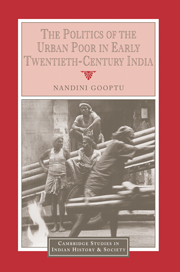Book contents
- Frontmatter
- Dedication
- Contents
- List of tables
- Acknowledgements
- List of abbreviations
- Select of glossary
- 1 The study and its perspectives
- Part I Changing contitions and experiences in interwar north India
- 2 The poor in the urban setting
- 3 Urban local policies and the poor
- 4 Urban policing and the poor
- Part II Modes of political action and perception
- Bibliography
- Index
3 - Urban local policies and the poor
from Part I - Changing contitions and experiences in interwar north India
Published online by Cambridge University Press: 05 July 2014
- Frontmatter
- Dedication
- Contents
- List of tables
- Acknowledgements
- List of abbreviations
- Select of glossary
- 1 The study and its perspectives
- Part I Changing contitions and experiences in interwar north India
- 2 The poor in the urban setting
- 3 Urban local policies and the poor
- 4 Urban policing and the poor
- Part II Modes of political action and perception
- Bibliography
- Index
Summary
The vast expansion in the ranks of the labouring poor in the towns in the interwar period generated grave concern amongst the urban propertied classes and local administrators alike. Terms such as ‘poor class people’, ‘inferior classes’ or the ‘lower classes’ featured as a focus of social anxiety in both official parlance and non-official vocabulary, and pointed to the mass of the poor in an undifferentiated way. Unlike in Victorian England, distinctions between the casual poor and respectable industrial labour were difficult to discern in interwar north India, given the fluid and shifting nature of urban work. Indeed, this very fluidity seemed to have engendered worries about a ‘floating’, footloose, rootless population living in penury, who were seen to disturb the social and cultural stability of the ‘better class’ or ‘decent’ people. The aversion of the Indian upper castes to physical work or manual labour as demeaning is also likely to have tainted all the labouring poor, not just a casual fringe, and probably partly explains the universal stigmatisation of the poor. Apprehension and fear about the disruption of the social, moral and political fabric of the city caused by the poor were evidently becoming so prevalent in the interwar years that one witness in his written evidence to the Provincial Banking Enquiry Commission (1929—30), observed that ‘it is surely needless to mention that an ill-fed, ill-housed and ill-clothed population is a menace to the peace, health and prosperity of the city’ (emphasis added).
- Type
- Chapter
- Information
- Publisher: Cambridge University PressPrint publication year: 2001



